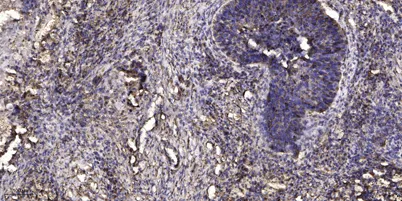LCP1 (phospho-Tyr28) rabbit pAb
CAT:
855-ES15175-02
Size:
100 μL
Price:
Ask
- Availability: 24/48H Stock Items & 2 to 6 Weeks non Stock Items.
- Dry Ice Shipment: No




LCP1 (phospho-Tyr28) rabbit pAb
- Description: Plastins are a family of actin-binding proteins that are conserved throughout eukaryote evolution and expressed in most tissues of higher eukaryotes. In humans, two ubiquitous plastin isoforms (L and T) have been identified. Plastin 1 (otherwise known as Fimbrin) is a third distinct plastin isoform which is specifically expressed at high levels in the small intestine. The L isoform is expressed only in hemopoietic cell lineages, while the T isoform has been found in all other normal cells of solid tissues that have replicative potential (fibroblasts, endothelial cells, epithelial cells, melanocytes, etc. ). However, L-plastin has been found in many types of malignant human cells of non-hemopoietic origin suggesting that its expression is induced accompanying tumorigenesis in solid tissues. [provided by RefSeq, Jul 2008],
- Synonyms: Plastin-2 (L-plastin) (LC64P) (Lymphocyte cytosolic protein 1) (LCP-1)
- Gene ID: 3936
- UniProt: P13796
- Cellular Locus: Cytoplasm, cytoskeleton. Cell junction. Cell projection. Cell projection, ruffle membrane ; Peripheral membrane protein ; Cytoplasmic side. Relocalizes to the immunological synapse between peripheral blood T-lymphocytes and antibody-presenting cells in response to costimulation through TCR/CD3 and CD2 or CD28 (PubMed:17294403). Associated with the actin cytoskeleton at membrane ruffles. Relocalizes to actin-rich cell projections upon serine phosphorylation (PubMed:16636079)..
- Host: Rabbit
- Species Reactivity: Human, Rat, Mouse,
- Immunogen: Synthesized phosho peptide around human LCP1 (Tyr28)
- Clonality: Polyclonal
- Validated Applications: WB, ELISA, IHC
- Stability: 1 year
- Concentration: 1 mg/mL
- Dilution: WB 1:500-2000;IHC-p 1:50-300; ELISA 2000-20000
- Molecular Weight: 68kD
- Storage Conditions: PBS with 0.02% sodium azide and 50% glycerol pH 7.4. Store at -20°C. Avoid repeated freeze-thaw cycles.
